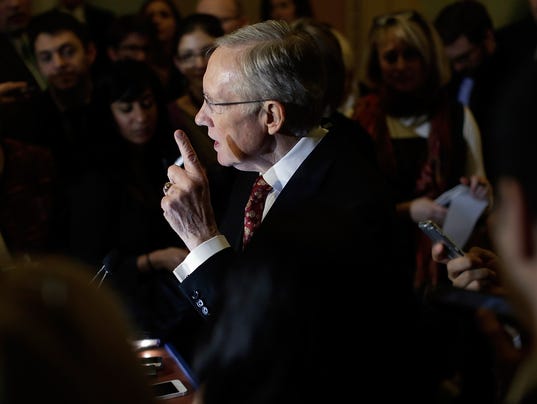U.S. Senate goes 'nuclear' on filibuster rules
Senate Democrats pushed through a controversial rules change known as the "nuclear option."
 |
| Senate Majority Leader Harry Reid, D-Nev., answers questions from reporters following the weekly policy lunch of the Democratic caucus on Nov. 19. (Photo: Win McNamee, Getty Images) |
Fifty-two Senate Democrats voted with Reid to reduce the threshold from 60 votes to 51 votes to approve executive and judicial nominees against unanimous GOP opposition. Three Democrats, Sens. Mark Pryor of Arkansas, Joe Manchin of West Virginia and Carl Levin of Michigan, opposed the change.
The rules change does not apply to Supreme Court nominees, who are still subject to a 60-vote filibuster threshold, or to legislation.
"The American people believe Congress is broken. The American people believe the Senate is broken. And I believe they are right," Reid said Thursday on the Senate floor. "The need for change is so very, very obvious."
The turning point in this latest showdown was Republicans' decision to block all three of Obama's latest nominees to the U.S. Court of Appeals for the District of Columbia Circuit, the nation's second most powerful court with vast jurisdiction over federal agencies and regulations.
STORY: First Take: Could partisanship get worse? It just did
The court currently has four judges appointed by Republican presidents and four by Democrats, with three vacancies. But six "senior" judges, five of them Republican nominees, tilt the court to the right. Republicans claim no more judges are needed, so they have based their opposition on workload, not the qualifications of Patricia Millett, Nina Pillard and Robert Wilkins.
Democrats control the Senate 55-45, but the majority is at stake in the 2014 elections. Republicans warned that it would not only tear apart cross-party relationships in the Senate, but it will come back to haunt Democrats if they return to the minority. "You will no doubt come to regret this, and you may regret it a lot sooner than you think," Senate Minority Leader Mitch McConnell, R-Ky., warned Democrats.
Only 22 Democrats have ever served in the minority. Vice President Joe Biden, who opposed a similar rules change as a senator, said Thursday that he supports Reid's decision.
The move is informally referred to as the "nuclear option" because it blows up long-standing Senate procedure and protection of minority rights. It would be the most far-reaching change to filibuster rules since 1975, when senators eased the two-thirds requirement for ending filibusters to today's three-fifths requirement of 60 votes.
Progressive groups cheered Reid's move. "This was not a decision made easily or taken lightly. There was no choice. The Republican minority had turned the existing rules into weapons of mass obstruction," said Alliance for Justice President Nan Aron.
Conservative groups said it would undermine minority rights in Congress. "For Harry Reid and President Obama, this is not about a couple circuit court judges; this is an attempt to remake America to reflect their unworkable and unpopular progressive vision," said Michael Needham of Heritage Action, which urged senators to oppose the rules change if it comes to a vote. "If Reid and his colleagues continue down this path, they will set a precedent that fundamentally alters the role of the minority in American politics."
Contributing: Associated Press

No comments:
Post a Comment